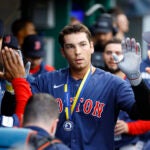Sign up for Red Sox updates⚾
Get breaking news and analysis delivered to your inbox during baseball season.
Get breaking news and analysis delivered to your inbox during baseball season.










| Game date | Home game | Competing team logo Competing team location | Game start time |
| This is a home game. | Logo for the Chicago CubsChicago | ||
| This is a home game. | Logo for the Chicago CubsChicago | ||
| This is a home game. | Logo for the San Francisco GiantsSan Francisco | ||
| This is a home game. | Logo for the San Francisco GiantsSan Francisco | ||
| This is a home game. | Logo for the San Francisco GiantsSan Francisco |
| Team | W | L | PCT | GB |
|---|---|---|---|---|
| Baltimore | 16 | 9 | .640 | 0 |
| New York | 17 | 10 | .630 | 0 |
| Boston | 14 | 13 | .519 | 3 |
| Toronto | 13 | 14 | .481 | 4 |
| Tampa Bay | 13 | 14 | .481 | 4 |
Stay up to date with everything Boston. Receive the latest news and breaking updates, straight from our newsroom to your inbox.